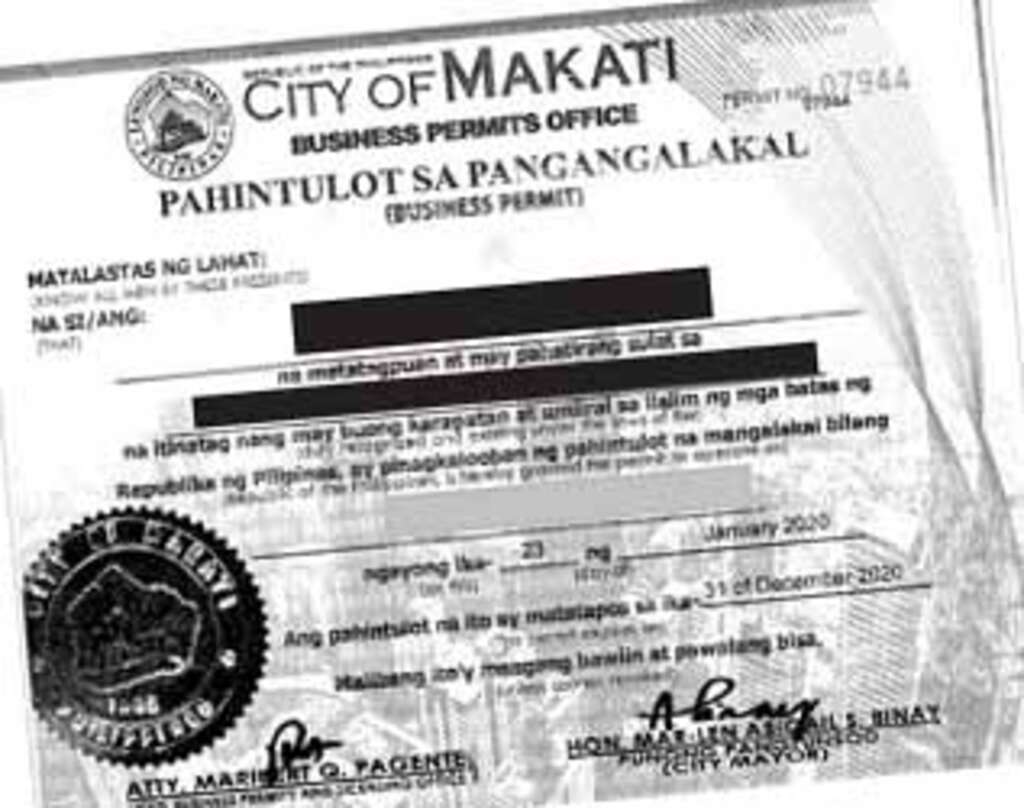So you’ve got the capital and the product to start your business. Can you operate right away? Well, you can, but you may not. It’s because no matter where you set up your business (whether it’s online or brick and mortar, in your house or an office building), you would need to register it to acquire a business permit, more popularly known as a Mayor’s Permit. Only then can you legally operate your business.
This also applies to those freelancers who offer online services and even bloggers/vloggers who earn a regular income for their efforts.
If you choose to ignore these requirements and forge ahead because you don’t have the time or the extra budget for them, your business won’t be legit. You might be able to get away with it initially, but you are handicapping your venture and setting it (and yourself) up for some measure of headaches in the future.
Now, who would want that to happen to their business?
This article will give you a bird’s eye view of the whole business registration process to help you avoid fines and legal issues that can land you in jail. Do note that all the information we are offering here is solely for educational purposes only and not a replacement for legal advice. For a more comprehensive guide on business registration, please click here.
Why do you need to register your business?
You might think that registering your business is just a hassle and an unnecessary additional expense, but there are benefits that can be gained from it. Here are the most important arguments for business registration:

Avoid fines and even jail time
Keep in mind that when you engage in any business and you derive a regular income from it, you are expected to file the tax returns out of that venture. The business permit will allow you to secure a Tax Identification Number (TIN) for your business that you will use to settle your tax at the Bureau of Internal Revenue (BIR). If you fail to file your tax returns, you are committing a form of tax evasion that is punishable by a fine and jail time.
Get access to financial services
Your business’ TIN, together with the BIR Certificate of Registration, otherwise known as Form 2303, is needed for you to open a corporate bank account, secure a bank loan and other financial services. You will also be entitled to free seminars from the Department of Trade and Industry (DTI) on how to grow your business, where to find supplies, and other important tips.
Establish a good reputation with your customers and investors
A certificate of registration that you can prominently display in your place of business is an assurance to your customers and investors that you are legitimate and that the products or services you offer are compliant with the standards set by law, therefore it’s safe to do business with you. One of the things you would need to avoid is for your business to be branded as a fly-by-night operation and a scam.
Get more opportunities to grow
Operating legally opens up a vast horizon for further growth. When you have a business registration, you can get more investors and projects and even enter bidding for government contracts if that is up your alley.
Gain more confidence to promote your business
Legitimacy gives you the confidence to highlight your company on any platform, be it on social media, traditional media such as newspapers and magazines, and on different websites. This allows you to reach more people that you can turn into regular and loyal clients. All these without worrying that the authorities (BIR, DTI, or representatives of your local government units where you belong) might get wind of your operation and slap you with penalties if it had been unregistered.
Contribute to the welfare of the country
This may seem too idealistic but being a registered business that regularly pays its taxes indeed helps in nation-building. The income tax we pay goes to various government projects and endeavors that ultimately benefit everyone, including businesses. Well-maintained roads, a steady supply of electricity, and a sturdy telecommunication system among others foster a healthy business environment.

We also need to emphasize that this business with the business permit is not a one-off thing, that once you have registered your venture, you can forget about it. You will need to renew the business permit every January of the succeeding years for as long as the business is running.
But for now, let’s focus on making your new business legit.
What are the steps in registering a business?
There are just four steps to make in business registration (it’s not as complicated as you might think).
Step 1. Determine the kind of business structure you have
Your business structure could be any of the following:
- Sole Proprietorship – owned by one person. This covers freelancers, professionals, and those selling homemade goods such as clothes, food, and anything else. It is taxed lower and has fewer regulations. On the downside, if your business can’t pay for loans or credits it has incurred, your creditor can go after your personal properties.
- One-Person Corporation – yes, a corporation made up of one person, so they do all the decision-making. Creditors can’t go after their personal assets in case debts aren’t paid. However, since it’s a corporation, it is charged higher taxes and there are more regulations to follow.
- Domestic Corporation – this applies to larger ventures where more than five investors can be on board and capital expansion is one of the goals.
- General Partnership – short of being a corporation due to financial constraints, this kind of business allows for two or more individuals to own the business and equally share in the assets, profits, and liabilities (both financial and legal).
- Other Types – these include Cooperatives, General Professional Partnerships, and Resident Foreign Corporations whose management and taxation are quite similar to the others discussed above.
Step 2. Register the business name or the corporate name
The process varies depending on the kind of business you have put up. You also have to remember that others may have already taken the name you prefer so you would need to come up with at least two alternatives.
- Self-employed/Single Proprietorship – by default, the business will be under the name of the owner. But if you want to use a different name or to put a few more words beside your name, for example, “Tom’s Digital Products,” then you need to have it registered with the DTI.
- For partnerships and corporations, you would have to register the name with the Securities and Exchange Commission (SEC).
Step 3. Obtain a Certificate of Registration from the BIR
This is one of the most important steps to make your operation legal (read: paying tax dues) and applies to all kinds of businesses. If you are caught doing business without the Certificate of Registration, you can be imprisoned for no less than 6 months but not more than 2 years. There are also fines to be imposed, with the actual amount based on where your business is located:
- P2,000 – 3rd-class municipality
- P5,000 – 2nd-class municipality
- P10,000 – 1st-class municipality
- P20,000 – city
Step 4. Secure a business permit
You can get this from the local government unit (LGU) of the place where your business is located. Ideally, you should be taking care of this in conjunction with your registration with the BIR. There are also four steps to take:
- Submission of all documents that the LGU requires
- Assessment of your place of business by the local fire department
- Payment of the assessment fees
- Claiming of the Mayor’s Permit

Which government agencies should you register with?
It is important to note that, depending on the type of business you are putting up, you may have to deal with some other government agencies aside from those already mentioned. For your convenience, we have listed down the departments for business registration.
- DTI – this is for single proprietorship. It ensures that no other entity will be able to use your registered business name.
- SEC – Securities and Exchange Commission. registering your partnership of corporation here will make your business a legal or judicial entity
- CDA – Cooperative Development Authority. All coops should register here as mandated by Republic Act 6938/6939.
- LGU – this is where you obtain the Mayor’s Permit or your “license to operate.” It signifies that your business is compliant with the requirements of the local government
- BIR – obtaining its Certificate of Registration will allow you to pay the tax dues of your business with the issuance of the TIN. You will also be able to legitimately print official receipts, invoices, and other financial documents.
- SSS – Social Security System, for businesses that have employees. Companies are required to remit their employees’ monthly contributions to the SSS.
- DOLE – Department of Labor and Employment. If your business employs five or more people, you are encouraged to register with the DOLE so that it can monitor if you are complying with the labor laws. Registration becomes a requirement if you have 50 or more employees.
If your business is engaged in the sale of products, you will have to register with the specific governing bodies:
Philippine Coconut Authority (PCA) – coconut and coconut by-products
Export Division
Elliptical Road, Diliman, Quezon City, Philippines
Tel. Nos. (+632) 928.8741 to 45
Email: pca_cpo@yahoo.com.ph
Website: https://pca.gov.ph/
Garments and Textile Industry Development Office (GTIDO) – garments and textiles for export
4F Industry and Investments Building
385 Sen. Gil J. Puyat Avenue, 1200 Makati City
Tel. Nos.: (+632) 976.5723 / 976.5700 loc. 5523
Fax: (+632) 976.5722
E-mail: gtido@dti.gov.ph
National Food Authority (NFA) – rice, corn, and flour
Department of Agriculture
6/F, Philippine Sugar Center Building
North Avenue, Diliman, Quezon City
Tel. Nos. (+632) 928.0721 / 453.3900 loc. 6225
Email: nfa_admin@nfa.gov.ph
Website: http://nfa.gov.ph/
Fiber Industry Development Authority (FIDA) – fibers and fiber products
License Division
Asia Trust Bank Annex Building
1424 Quezon Avenue, Quezon City
Tel. Nos.: (+632) 373.7489 / 373.9241
Fax: (+632)373.7494
E-mail: fida@pldtdsl.net.ph; fida@pacific.net.ph
Website: http://fida.da.gov.ph/
Bureau of Fisheries and Aquatic Resources (BFAR) – fish and fish products and other aquatic products for export
Licensing and Regulatory Division
Philippine Coconut Authority (PCA) Building
Elliptical Road, Diliman, Quezon City
Tel. No.: (+632) 929.9597 / 929.8074
Email: info@bfar.da.gov.ph; webmaster@bfar.da.gov.ph
Website: www.bfar.da.gov.ph
Bureau of Animal Industry (BAI) – animals and animal by-products for export
Animal Health Division
BAI Visayas Avenue, Diliman, Quezon City
Tel. No. (+632) 928.2836 / 928.2778
Fax No. (+632) 928.2429
Email: quarantine.bai@yahoo.com
Website: http://www.bai.da.gov.ph/
Bureau of Plant Industry – plants and plant products for export
692 San Andres St., Malate, Manila
Tel. No.: (+632) 525.7857
Fax No.: (+632) 521.7650
E-mail: cu.bpi@da.gov.ph
Bureau of Forest Development – forest products such as logs, plywood, lumber products, and others for export
Forest Management Bureau
Visayas Avenue, Diliman, Quezon City
Tel. No.: (+632) 927.6229
Email: fmbdenr@mozcom.com
Website: forestry.denr.gov.ph
National Tobacco Administration (NTA) – flue-cured Virginia-type tobacco, Burley tobacco, and Turkish/Oriental tobacco production and export
Scout Reyes Street cor. Panay Avenue, Diliman, Quezon City
Telefax No.: (+632) 374.3987 / 374.2505
Email: mis@nta.gov.ph
Website: nta.da.gov.ph
Food and Drug Administration (FDA) – food, drugs, and cosmetic products
Civic Drive, Filinvest Corporate City
Alabang, Muntinlupa City
Tel. Nos.: (+632) 807.0721 / 842.5606
Fax No.: (+632) 807.0751
Email: bfad@bfad.gov.ph
Website: http://www.fda.gov.ph/
Now that you have a clearer idea of how to make your business legit and avoid penalties and even imprisonment, it’s time to think long and hard about the name for which your business will be known. Believe it or not, this could make or break your venture.

What’s in a [business] name?
Might not be obvious, but there’s a lot at stake when you are naming your business. It’s the branding for your company, which means it’s how your customers will identify you. Thus, not only should it be catchy enough but must also be easy to remember. Equally important, it must not be easily confused with another brand.
Making your business unique, easily recalled, and effectively represent what you’re offering to your customers is already half the battle won.
Creating a business name
As discussed earlier, for business registration you would need to register a business name with the DTI if it’s not just your true name that you will be using. It will also ensure that others won’t be able to use it within the validity period of five years (after which you can renew it).
Keep in mind that the business name will be your venture’s identity forever, so make sure it’s not something that you need to think more seriously about. Is it politically correct? Will it offend the sensibilities of certain groups? Does it reflect clearly what I am offering to the public? These are just some of the questions you need to ask when trying to come up with your business name.
As for the DTI’s take on this, its requirement for a business name is for it to have a “dominant portion” and a “descriptor.”
The dominant portion, which could be a word or phrase and can include numbers, refers to the term in the name that carries the main message of what the business is all about. The descriptor, on the other hand, may give some more idea about the business or simply modify the dominant word.
For example, a tattoo shop in Puerto Galera is named “Tanging Henna Tattoo.” The dominant word there is “tattoo” as it informs the public what the business is all about. The descriptor is “Tanging Henna,” which is both hilarious and easy to remember, being a play on the Filipino movie title, “Tanging Ina.”
The DTI also requires that the business name you are registering is not similar to existing ones, too generic, or using popular abbreviations as part of the name such as NBI Investigation Services, WHO Medical Clinic, DTI Marketing, etc.
Business name vs. trade name
The business name is what a company registers with the appropriate government agency to represent it as a legal entity. The trade name, on the other hand, is usually what the public would identify the company’s products or services with.
A lot of times, a company’s business name is also its trade name, such as Jollibee. Its business name is Jollibee Foods Corporation and its fast-food brand is simply Jollibee. But Jollibee Foods Corporation also owns Chowking, a Chinese cuisine fast food restaurant.

What’s a trademark and why is it important for your business?
A trademark is a protection for any identifying aspect exclusive to your registered business, which includes logos, letters, words, colors, and any other unique marks. This will ensure these identifiers are yours and that no other can use any of them especially if your business takes off and becomes successful. You don’t want copycats riding on your success. You can seek a trademark from the Intellectual Property Office of the Philippines (IPOPHIL) but only after you have registered your business name with the DTI.
Updating your business name information
Your business name will be valid for five years, after which you have the option to renew it for another five years. Sometimes, though, you find the need to modify certain information pertaining to the business. The DTI allows the following to be changed:
- Address of the business
- Line of the business but only if it’s related to the original and that the approved business name
will still be applicable
- Capitalization of names and other nouns, which were put in lowercase letters during the
registration process
- Products and services
- Name of the registrant if female and she got married and changed her name
Renewing your business name
According to the DTI, you can renew your business name as early as 18 days before its expiration. If you are beyond the expiration date, you can still do the renewal without penalty as long as you do it within 90 days. What’s even better is that you don’t need to go to any DTI branch as everything can be done online.
Here are the simple steps to renewing your business name:
- Log on to bnrs.dti.gov.ph and go to Business Name Services. Click on “Renewal,” review the terms and conditions and click on “I Agree.”
- Enter your Transaction Reference Number (TRN) or Reference Code that you can find on the certificate of registration that was issued to you when you registered for the first time. Click on “Search.” Once you find your business name in the list of search results, click on it.
- You will be redirected to the Transaction Summary Page. Click on “Next.” A pop-up will appear showing “Renew Only” and “Update Scope and Renew.” If you don’t need to update anything, click on “Renew Only” to proceed to step 4A. If there are changes that need to be made, click on “Update Scope and Renew” to proceed to step 4B.
- 4A. On the renewal page, you can check the details of your registration, then input the best descriptor for the kind of business you have.
4B. After clicking on “Update Scope and Renew,” you’ll be asked to choose the new Territorial Scope. Changing it will trigger the validation process for your business name. You will need to put in the dominant name and descriptor for your business as well as its nature, then click on “Check Name Availability.” Once your business name is validated, click on “Next.”
- The Regular Renewal Summary Page should appear. Review the details there and then click on “Next” opening a new pop-up window. It will have your new Reference Code. Make sure you copy the code or screenshot the whole thing as you will need it for all transactions with BNRS.
- Conform to the Undertaking, after which you can click on “Proceed.” You will now be able to download the Undertaking into your gadget.
- Go to the payment section that has different options: credit or debit card, GCash, PayMaya, Landbank Link.BizPortal, and DTI Teller. You can settle the payment within seven calendar days. Once your payment is confirmed, your Business Name Registration renewal is complete.
Final Thoughts
As has been emphasized throughout this article, making your business legitimate and legal by registering it with the appropriate agencies is one way to help it grow and become successful.
Yes, the whole registration process may be somewhat of a hassle and will need some of your time and attention, but it’s much better than paying the penalties and/or landing yourself in jail for operating illegally and for tax evasion. That is surely not what you want for your fledgling business and yourself as an entrepreneur.
You would also need to make sure that you have a great location to grow your business. And did you know that you don’t have to have your own office for that? A coworking space is ideal for startups with its flexible arrangements tailored to fit your requirements even as it takes care of your basic office needs at a cost lower than what a traditional office demands.

At Weremote, you can discover versatile coworking spaces, private offices, and virtual offices, complemented by inclusive amenities and a vibrant community. We’re dedicated to helping you thrive and unlock your full potential on your professional journey—because we offer more than just spaces.
Weremote stands as a community where professionals and businesses thrive, offering a dynamic environment for growth. As the coworking brand of Wrkspace Office Management and Solutions Inc., Weremote continues to foster professional development and build vibrant communities. Weremote is a portfolio company of AHG Lab, the largest independent venture builder in the Philippines.
